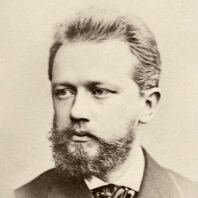Pyotr Ilyich Tchaikovsky
Composer
Pyotr Ilyich Tchaikovsky’s personal unhappiness seems to be at odds with the success his music enjoyed during his lifetime. On the other hand, the composer’s suffering, passed down in letters, undoubtedly contributed to the emotionality of his tonal language, which continues to win the hearts of the music world today.
Tchaikovsky was born in 1840 and came from a wealthy but not very musical family. He abandoned his initial career as a lawyer and civil servant to enrol as a student at the newly founded conservatoire in St Petersburg in 1862. For a long time, the extremely self-critical composer was plagued by doubts about his own technical skills. The homosexual composer’s marriage to a woman he hardly knew ended in disaster. Tchaikovsky received great financial and spiritual support from his patron Nadezhda von Meck, the wealthy widow of a railway entrepreneur. The two only saw each other from a distance on a few occasions, but kept up an extensive correspondence. A few days after conducting the premiere of his Sixth Symphony “Pathétique”, Tchaikovsky died at the age of only 53 under circumstances that were never fully explained. Almost all colleagues acquainted with Tchaikovsky, including Dvořák, Brahms and Mahler, were taken by his warm-hearted and modest personality. Tchaikovsky is best known for his last three symphonies, solo concertos, chamber and ballet music, and his Pushkin operas Eugene Onegin and The Queen of Spades. In the period of his growing international fame, Tchaikovsky conducted two concert programmes of his own works with the Berliner Philharmoniker in 1888 and 1889. Since Kirill Petrenko took up his post as chief conductor, the composer has experienced a new heyday with the Berliner Philharmoniker.